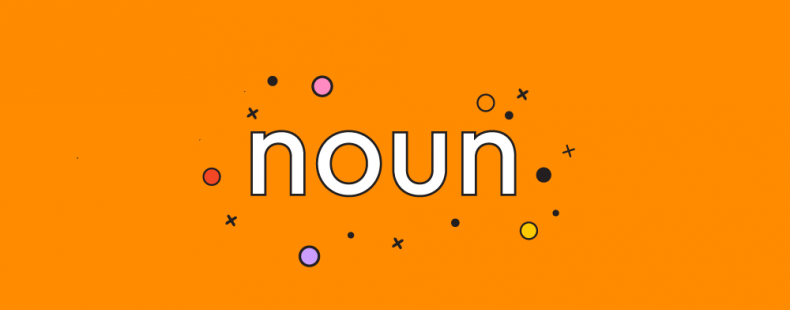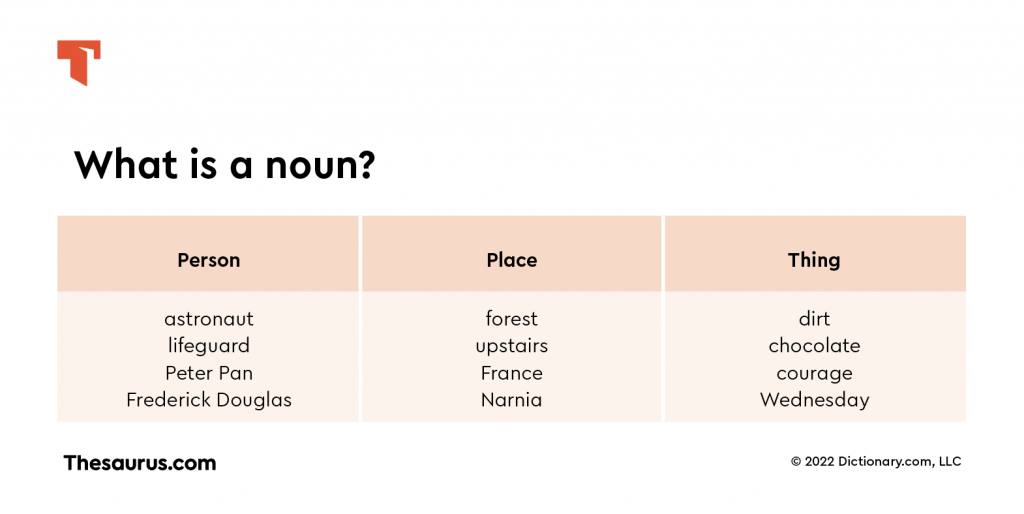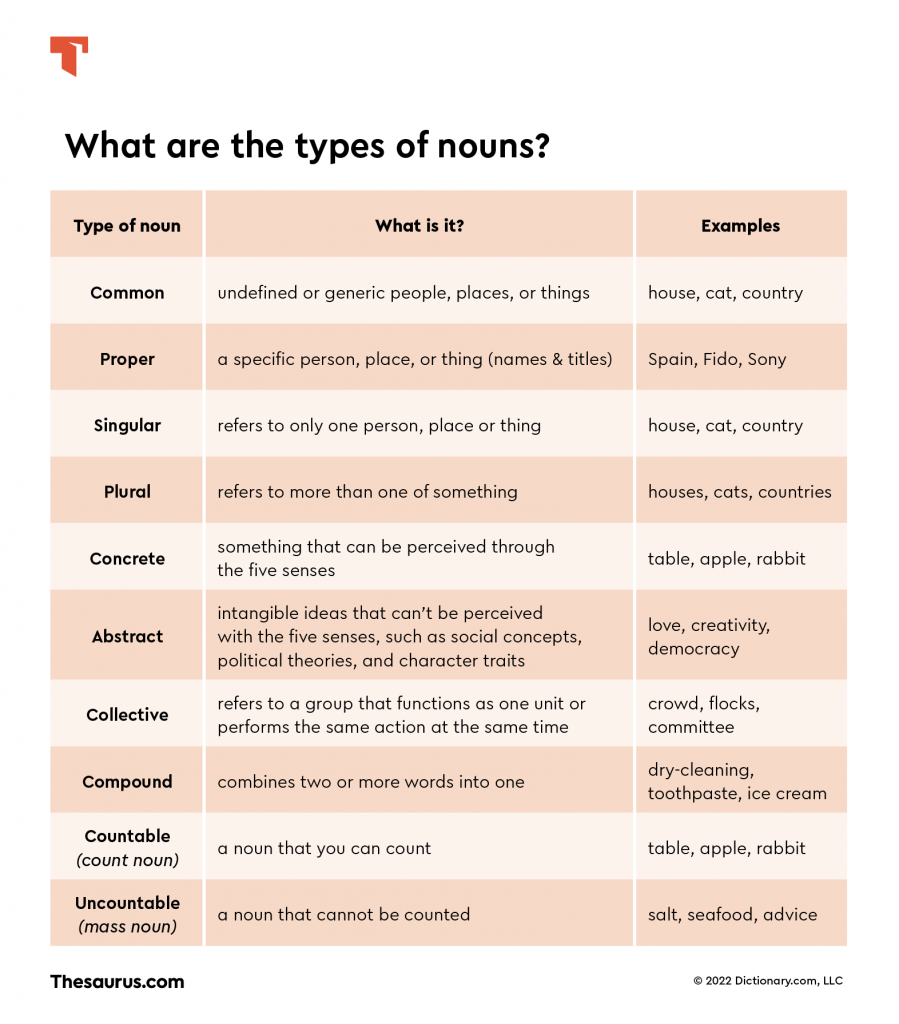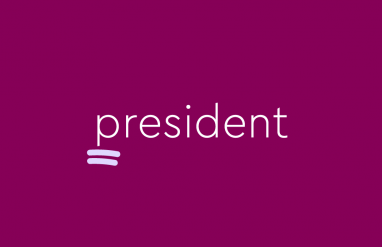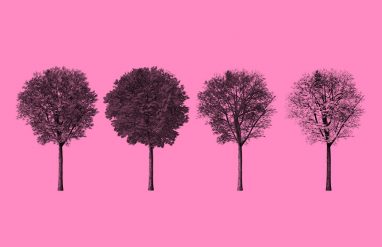If you take a walk around town, you’ll see many different things. You might see some ducks. You might go to the beach. You might stop and talk to your friend Patrick. You might even feel pain if you trip and scrape your knee. There is one thing that ducks, beaches, pain, and Patrick have in common: they are all nouns. Lots of the words we use are nouns. Nouns appear in almost all of our sentences, so it is only fair that we learn a little bit more about these helpful words. First, we will figure out what a noun is and then learn about the different types of nouns and how to use them in sentences.

What is a noun?
Most of us learned the classic definition of noun back in elementary school, where we were told simply that “a noun is the name of a person, place, or thing.” That’s not a bad beginning; it even clues us in to the origin of the word, since noun is derived ultimately from the Latin word nōmen, which means “name.”
As we see from its dictionary definition, a noun can name not only a physical thing but also abstract things such as a state (happiness) or a quality (beauty). The word is defined further in terms of the way it functions in the language—as a subject or object in a sentence or as the object of a preposition. In any of those positions, it can be modified by an adjective or adjective phrase: a talented but quirky artist.
Let’s start by diving into the classic definition of the word noun, and what it means to refer to “person, place, or thing.”
People
Nouns are used to refer to people. This includes general words for types of people such as clown or teenagers, as well as names of specific people such as Erica or George Washington. Here are some examples of nouns that refer to people:
- astronaut, mother, thief, salesman, friend, stranger, lifeguard, boss
- Santa Claus, Frederick Douglass, Peter Pan, Abraham Lincoln, Nina Simone, Captain Kidd
Places
Nouns can also refer to places. Again, this includes general words for places such as desert or outside, as well as names of specific places such as Texas or South America. Take a look at some of these nouns that refer to places:
- forest, island, jungle, city, alley, neighborhood, upstairs, basement
- France, China, Egypt, Tokyo, Istanbul, Madrid, Narnia, Valhalla, Bikini Bottom
Things
Lastly, nouns can refer to things. This is a very broad category of stuff. When we say that nouns refer to “things,” we mean objects that you can detect with your senses such as table or bus, as well as more complicated things that you can’t sense such as fear or democracy. To get a better idea of how nouns can refer to things, check out these examples:
- dirt, music, bunny, chocolate, iPad, computer, flower
- courage, greed, time, pacifism, intensity, Wednesday, July
How are nouns used?
Nouns have several different important uses. We use nouns to give names to everything. For example, the hairy animals that fetch sticks and chase cats are called dogs. In this way, nouns make it much easier for us to describe the world around us. In grammar, nouns can serve two important functions. First, nouns can act as the subjects or parts of the subjects of verbs. Subjects work with verbs to tell us who or what is doing something:
- Jessica went to the bank.
- Ice cream is delicious.
- The store is having a sale.
Learn more about how to identify a subject (and predicates!) with this handy article.
The second important use of nouns is they can act as the objects of verbs and prepositions. Objects, in grammar, tell us what or who is having something done to them:
- Daisy loves Donald.
- They speak Spanish.
- He betrayed his friend for money.
- She is a woman of many talents.
Types of nouns
There are many different types of nouns that we use to refer to a wide variety of people, places, things, and ideas. Let’s take a quick look at each of the different types of nouns and how we would use them in a sentence.
- Common nouns refer to broad categories of things and are not capitalized: chair, car, monkeys, socks, peanut butter, hunger, teacher, worm, disgust.
- I ate pizza for dinner.
- Proper nouns refer to specific people, places, and things. Proper nouns are capitalized: Wonder Woman, Russia, Jupiter, Chicago, Band-aids, Playstation, Google.
- Dr. Armstrong is an excellent surgeon.
- Singular nouns refer to a single thing: person, bicycle, cat, queen, Ohio, King Tut.
- The reckless driver smashed into my mailbox.
- Plural nouns refer to more than one of something: bees, afternoons, countries, women, geese.
- Oranges are a healthy snack.
- Concrete nouns refer to things you can experience with your senses: candy, keyboard, paper, sand, fish.
- Where are the pencils?
- Abstract nouns refer to intangible things and emotions that you can’t detect with the five senses: shyness, anger, peace, motion, confusion, expenses, chaos.
- She was filled with rage.
- Collective nouns refer to groups of things. They can be singular or plural: army, gang, committee, club, team, society, cult.
- We chased after the herd of cows.
- Compound nouns combine multiple words to form a single noun: downtown, snowstorm, killjoy, busybody, free fall, know-it-all.
- I had to stop to tie my shoelaces.
- A countable noun refers to things that can be counted: banana, tree, coins, students, wheel, basketballs.
- He bought four shirts that were on sale.
- Uncountable nouns refer to things that can’t be counted: furniture, water, blood, depression, photosynthesis.
- It says on the bottle that this medicine might cause dizziness.
All the nouns, none of the errors
We’ve got a noun for you: genius! And that’s what you’ll be when you check your writing on Thesaurus.com’s Grammar Coach™. This uncommon tool can definitely spot the difference between your proper and common nouns—and more! Grammar Coach™ uses machine learning technology uniquely designed to catch grammar and spelling errors. Its unique Synonym Swap will find the best nouns, adjectives, and more to help say what you really mean, guiding you toward clearer, stronger, writing.
Whether you’re writing about a person, place, or thing, perfect grammar has never been easier!
